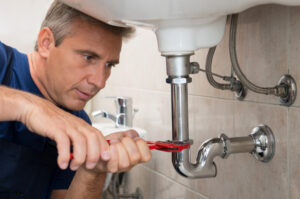If you’ve ever wondered what a Plumber does, you’re not alone. A plumber specializes in a wide variety of plumbing jobs, including potable water installation and sewage system maintenance. These professionals are also adept at drainage system installation, as well as the maintenance and repair of these systems. A plumber can also handle emergency plumbing needs, such as a clogged drain. Here are some things to keep in mind when hiring a plumber:

Plumbing jobs are varied and vary widely. Plumbing contractors do everything from installing water lines in buildings to unclogging drains in refrigerators. They also install faucets, toilets, water heaters, and dishwashers. A plumber may also unclog pipes and maintain septic systems. In addition, plumbers can solve a variety of plumbing emergencies, such as a leaking faucet. Some plumbers are also involved in construction or demolition projects.
A plumber’s job is highly regulated, and most states require a license. The licensing agency varies by state, but plumbers must have a high level of experience to practice independently. In addition, they must undergo ongoing training to stay up to date with the latest trends in the plumbing industry. A plumber with a valid license must carry state-mandated insurance and bonding. These insurances are required for plumbing professionals to protect customers from financial loss during the repair process.
Historically, the word plumber originates from the Roman Empire, where lead was used in pipes and conduits. Lead was also used to make baths. This term, plumbum, was used to describe lead in ancient times, but modern plumbing materials are much more flexible. Among plumbing tasks, water supply includes water taps, pipes, and sewage systems. In medieval times, anyone who handled lead in plumbing work was referred to as a plumber.
Plumbing requires skills in problem-solving and customer service. Many plumbers specialize in areas such as air conditioning, sanitation, and ventilation. With a high level of education and training, a plumber can become a senior manager or estimator. As the plumbing profession grows in popularity, there’s a bright future for this profession. According to the Bureau of Labor Statistics, there will be a 15% increase in job openings between 2016 and 2026. However, this growth is dependent on the overall health of the economy and is not a guarantee.
Another thing to keep in mind when hiring a plumber is how much experience they have in the field. While hiring a plumber, make sure to ask about the plumber’s experience, qualifications, and fees. It’s never a bad idea to price shop. Remember, plumbing emergencies can be expensive, so you don’t want to hire the first plumber who offers a pricey estimate. Ask about warranty plans and annual service plans before hiring a plumber.
The cost of hiring a plumber depends on the complexity of the job and the timing of the appointment. In many cases, a plumber charges a trip fee, which covers travel time and materials. These fees can vary widely, ranging from $50 to $300. Some plumbers don’t charge a trip fee but will require a minimum one or two-hour service. Plumbing companies also charge for diagnostic time, which can add up to an additional $250 to $300.
Depending on the type of plumbing work you require, plumbers charge anywhere from $45 to $200 per hour. Depending on the complexity of the work, the materials needed, and the amount of time spent on the job, plumbers can charge as little as $50 for a simple drain unclog. However, if the job is more complicated, a master plumber may be required. In some states, only master plumbers can perform such tasks. The average price for an unclogged drain repair is $200, but plumbers may charge more for emergencies.
Apprenticeships are the most common path to becoming a plumber. An apprenticeship is a four to five-year training program sponsored by a contractor or trade union. This training involves hands-on training and educational hours. Apprenticeships generally last four to five years and require several hundred hours of classroom training. Apprentices typically require a high school diploma, and many states require a license to work independently. The training programs are extremely competitive and often take place in a plumbing trade school or union.
A plumber should be able to perform both minor plumbing repairs and more complex plumbing problems. If you have a water heater malfunctioning, it can be extremely frustrating to use a hot shower in the middle of winter or a cold shower in the summer. The same is true for frozen pipes, which can also lead to water damage. When you are in need of a plumber, make sure you call a professional as soon as possible. You will be glad you did!
